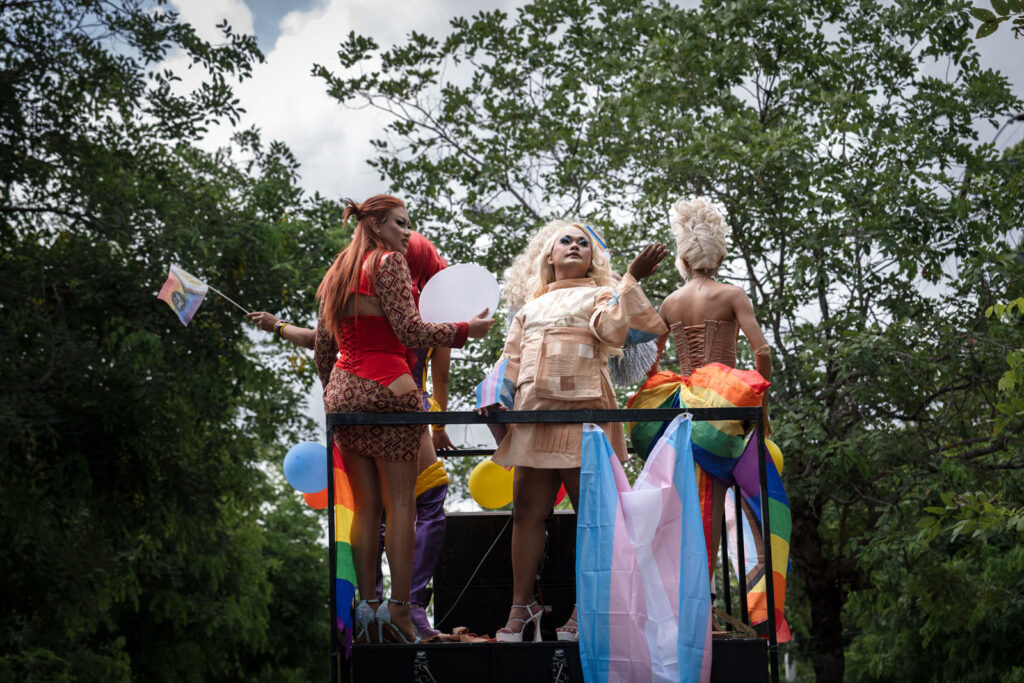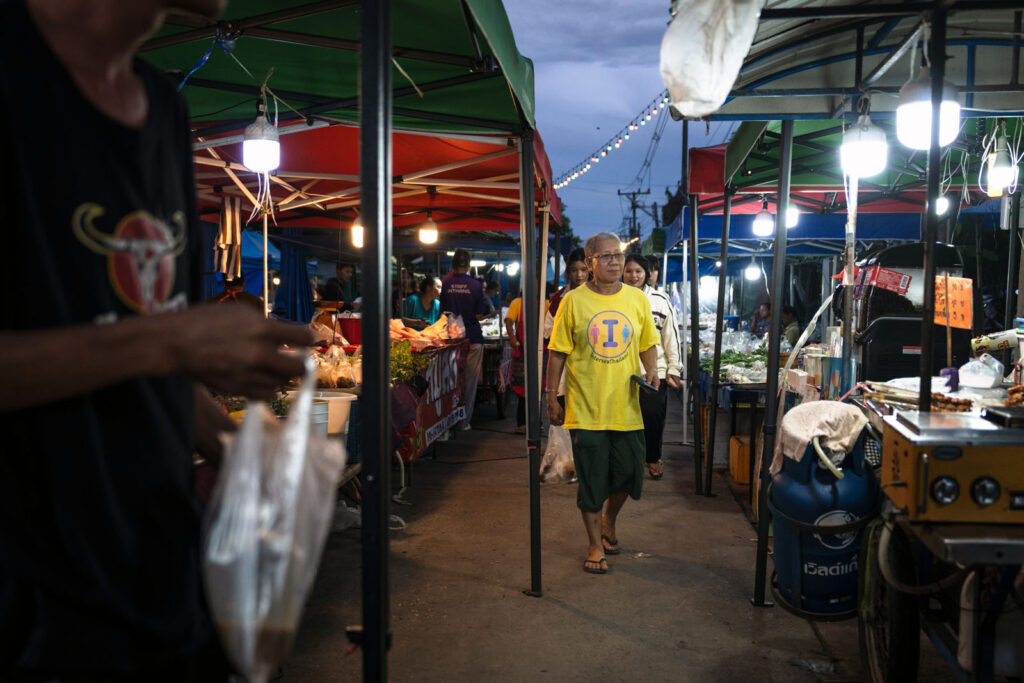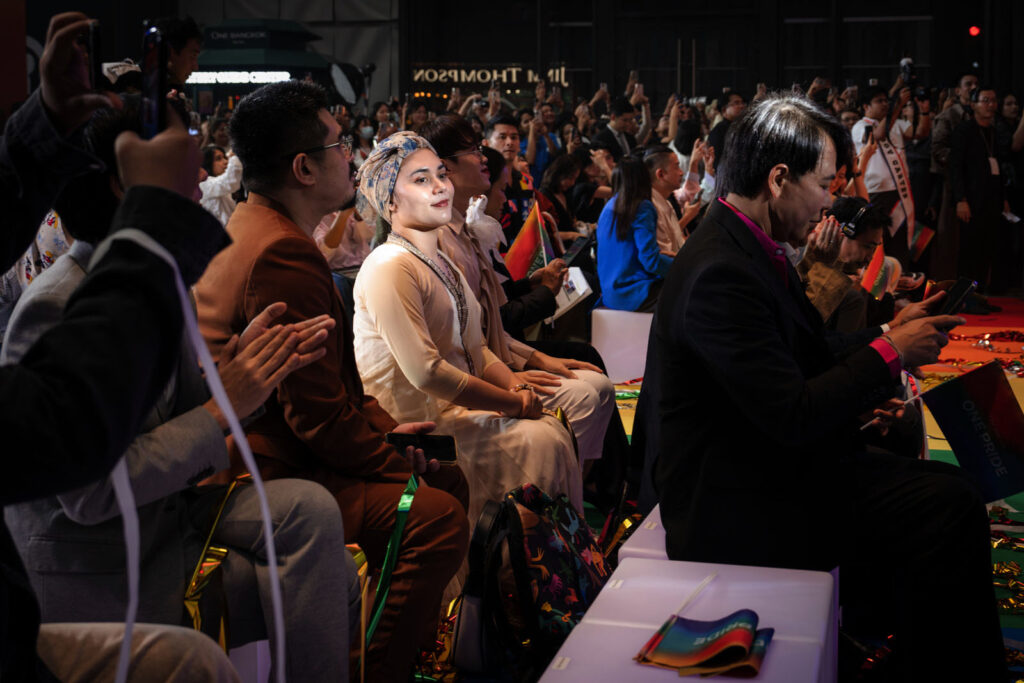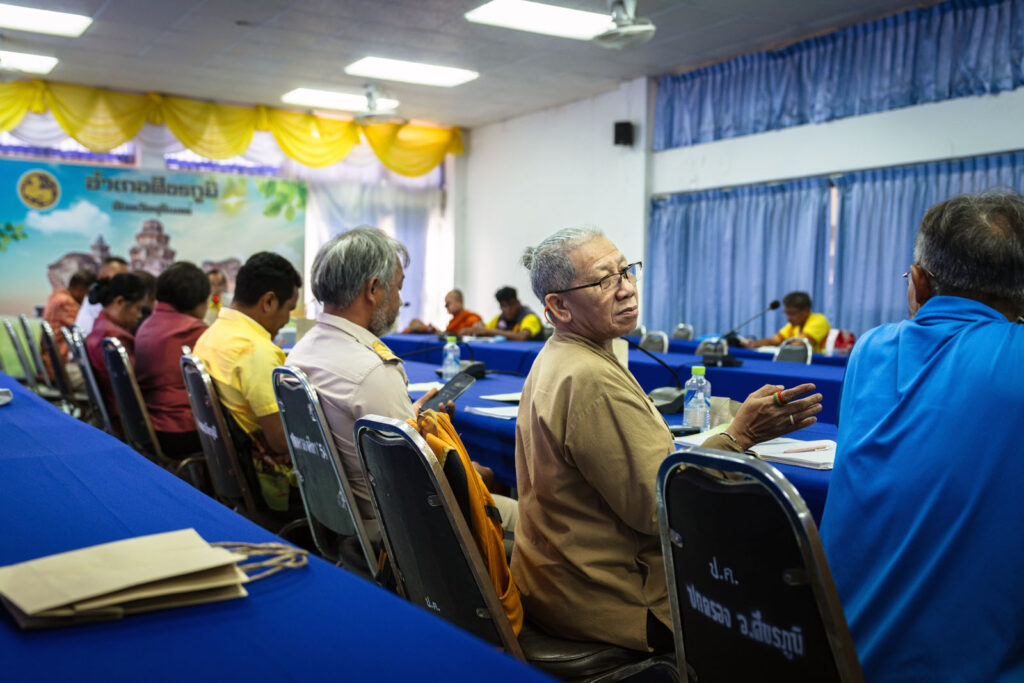This article was originally published on HaRDstories.
The rainbow flags seemed brighter this year. Across Thailand’s major cities, Pride Month parades pulsed with energy as large crowds danced through the streets, celebrating the country’s recent same-sex marriage law. For Southeast Asia’s first nation to achieve marriage equality, the moment felt historic.
But for Phakwilai Sahunalu, the celebrations were also an opportunity. As the 61-year-old co-founder of Intersex Thailand moved through the crowds in his northeastern province, he promoted another cause – the Gender Recognition Bill that could represent the next breakthrough in Thailand’s LGBTQI+ rights.
“We are far away from truly being an open society that respects the rights of every gender group. There is still prevalent discrimination and harassment, while many aspects of LGBTQI+ rights are still unprotected by the law,” he said.
Because for all the country’s progressive achievements, an entire community remains legally invisible. Thailand’s legal system only recognises male and female identities, leaving intersex and non-binary individuals without recognition, vulnerable to discrimination and denied basic rights.
Unrecognised intersex identities
Intersex is an umbrella term for people born with sex characteristics that don’t fit typical binary notions of male or female bodies, according to the UN Office of the High Commissioner for Human Rights. It is estimated that about 1.7 percent of the global population are born with intersex traits.
Although intersex people are internationally recognised as part of the LGBTQI+ community, awareness and understanding in Thailand remains very limited, said Phakwilai, who co-founded Intersex Thailand to support and promote the rights of the intersex community.

Dr Sira Korpaisarn, a physician specialising in endocrinology and metabolism at Ramathibodi Hospital’s Faculty of Medicine, explained that unfamiliarity with intersexuality stems largely from the complexity of intersex conditions.
“Intersex is the condition when a body has alterations of sex chromosomes, sex hormones, or reproductive organs that differ from typical male or female body, which lead to distinct physical development and sexual characteristics,” Dr Sira said.
Because various factors contribute to intersexuality, there are diverse types of intersex conditions. Each intersex person can have different gender identities or sexual orientations. Some conditions are considered health issues requiring specific medical care and treatments.
“Due to the complexity and sensitivity of intersex conditions, even most doctors outside this field of specialty do not fully understand intersexuality,” he said.
As intersex is a relatively new term in Thailand, it’s unsurprising that authorities and the general public remain unaware of intersex people and their rights, contributing to difficulties accessing proper healthcare.
Phakwilai has first-hand experience with such discrimination and difficulties. He discovered his intersex identity relatively recently.
“I only learnt about intersexuality eleven years ago and realised I was actually intersex,” he said.
Born female, Phakwilai knew from childhood that something felt different. “I thought I was just a tomboy until I noticed strange developments in my body during puberty – I developed a penis and testicles, but still had breasts and menstruation.”
For decades, he felt alienated and ashamed of being different. The realisation that he was intersex brought relief and understanding.
“Now I know I’m not alone and there are many people whose sex doesn’t conform to male or female stereotypes,” he said.
But understanding his identity didn’t solve his legal problems. When Phakwilai sought gender-affirming surgery to remove his breasts, he was denied because Thai law still classifies him as female and the surgery was seen as cosmetic surgery. The contradiction highlights the gap between Thailand’s progressive reputation and its binary legal framework.
“Although Thai society is becoming more accepting of gender diversity, without legal recognition of our rights and identity, intersex people still face discrimination and are denied basic rights,” he said. “This is why we need to push for the Gender Recognition Bill – as a new legal tool to ensure recognition and protection for intersex people.”

Forced gender-selection surgery
Beyond the difficulties of securing basic rights, intersex people face another major problem: coercive medical interventions at birth.
According to Dr Sira, when a child is born with ambiguous sex characteristics, standard medical procedure involves gender-selection surgery. Doctors consult with parents to choose a sex for their child.
Aitarnik Chitwiset, co-founder of Thai Intersex Rights, stressed that such interventions can create lasting trauma. Since the surgery happens without the child’s consent or awareness, many grow up feeling their assigned gender doesn’t match their identity, leading to lifelong psychological suffering.
The United Nations has condemned such non-consensual surgeries as human rights abuses in its resolution on combatting discrimination against intersex people.
“It is essential that the gender selection at birth for intersex children must end,” Aitarnik said. “It is the child’s right to self-affirm their sex when they are old enough and ready to choose.”
Born and registered as male, Aitarnik spent years confused about her identity as her body failed to develop typical masculine features during puberty.
“I always thought that I was just a very feminine ladyboy, as my body didn’t develop much masculine features, so I was mostly female-like,” she said. “But then one day when I was 26, I had menstruation blood. It was very shocking.”
Only after consulting colleagues at Thai Intersex Rights did she learn she was intersex. Yet her birth certificate still lists her as male with the title “Mr”, despite her distinctly female appearance.
This mismatch creates daily challenges in Thailand’s binary society. Aitarnik faces confusion during phone transactions requiring identification, though she acknowledges others experience far worse discrimination.
Nevertheless, she emphasised that it’s crucial for authorities to recognise other genders, as it’s the right of non-binary and diverse-gender people to identify their gender identity.

Living beyond the binary
Intersex people aren’t the only ones suffering from lack of legal recognition and protection of their rights. Non-binary individuals, those whose gender identity exists outside male and female categories, face similar challenges.
Tawan Talankul, a 22-year-old master’s degree student who identifies as non-binary and intersex, believes official recognition of gender diversity is essential for fostering public acceptance and inclusivity.
“As I identify myself as non-binary intersex, I view gender and sex not as two polar opposites of male and female, but a spectrum with many colours in between,” Tawan said. “Since I was a child, I noticed that I don’t want to conform with either male or female stereotypes, so I just be who I want to be.”
For Tawan, it’s simply a matter of choice. “This is just like other things in life, we always have more than two choices for what we would like to eat or how to dress. The choice is up to the personal preference.”
Born female, Tawan was later diagnosed with a condition that prevents their body from properly producing sex hormones, leading to atypical development.
Being different from societal norms has brought alienation and ridicule – not just from university peers, but from some professors as well.
“I think this is because most people in society don’t understand gender fluidity and still have a strict binary mindset,” Tawan said. “They often say I’m overreacting or joking when I identify myself as intersex. Many people expect me to follow societal norms and choose to follow either one of the gender stereotypes.”
What is the gender recognition bill?
Since not all genders receive recognition and protection under Thai law, People’s Party MP Tunyawaj Kamolwongwat said a new Gender Recognition Bill could provide solutions.
“Gender and sexuality are a part of life. It is about the identity and liberty of every person,” Tunyawaj said. “This law will assure the right to express their identity and live in the way that they choose.”
The legislation would also protect intersex and transgender people from alienation and discrimination by providing legal rights and status, making them an official part of society, Tunyawaj added.
According to iLaw’s analysis, there are other four draft bills on gender recognition from Move Forward Party, the Department of Women’s Affairs and Family Development, Thai Transgender Alliance, and Intersex Thailand.
Although the bills differ in details based on their drafters’ approaches, they share four core principles: allowing citizens to officially register their gender identity, recognising sexes other than male and female, prohibiting gender selection surgeries for intersex babies, and permitting people to change their titles to suit their preferred gender.
As the architect behind Move Forward Party’s draft, Tunyawaj hoped this bill would be the next momentous LGBTQI+ legislation after same-sex marriage legalisation, ensuring everyone’s right to self-determination of their own sex and gender.
Political contest for recognition
However, the bill proved too controversial. On 21 February 2024, MPs overwhelmingly rejected Move Forward Party’s draft on the grounds that recognising genders other than male and female contradicted Islamic teaching and could enable fraud.
Tunyawaj said it’s unlikely any of these draft bills will gain parliamentary approval soon, as the remaining three are still collecting the 10,000 signatures required for parliamentary consideration.
“The main challenge of this bill is that a lot of people still consider this law too extreme, either because of their lack of understanding, fears, or conservative beliefs,” he said. “So, we have a big task ahead to correct these misunderstandings and fears.”
Chalidaporn Songsamphan, who lectures on politics of sexuality and feminism at Bangkok’s Thammasat University, agreed that changing mindsets on gender diversity remains the biggest challenge for LGBTQI+ recognition and protection.
Despite nationwide Pride celebrations promoting LGBTQI+ rights and identities, these annual events don’t reflect general perception and awareness in Thailand, Chalidaporn said.
“Despite efforts to raise public awareness on gender diversity during Pride Month, these campaigns are often limited to small groups and fail to engage society at large,” she said.
She noted that there are also disparities in representation of each LGBTQI+ group, especially intersex and non-binary people, who are often obscured by larger groups and largely unknown among the general public.

She highlighted that whilst Thai society is arguably more tolerant of LGBTQI+ people, most still firmly adhere to binary perceptions of sex and gender. Intersex and non-binary individuals, with their complexity in physical appearance and identity, are often misunderstood and marginalised as social misfits.
“The promotion of LGBTQI+ rights and identity is the long-term campaign and the Gender Recognition Bill is just another tool,” Chalidaporn said.
“I personally don’t have much hope for the Gender Recognition Bill, as there’s no guarantee what its final form will be. Instead, we need strong political action to challenge the binary societal gender norms and gradually raise public awareness to understand and accept the complexity of gender and sex.”
Pratch Rujivanarom frequently writes about environmental justice and human rights in Thailand. He graduated with a Master’s degree in International Journalism from Birmingham City University, UK.
Chanakarn Laosarakam is a photojournalist and stringer for AFP (agence france-presse) regularly capturing pivotal moments in politics and human rights.
